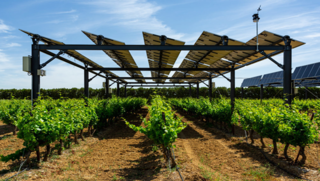Workshop on Agrivoltaics: Israel’s Experience in Advancing Photovoltaics for Sustainable Land Use and Energy Solutions
5 March, 2025, online

On 5 March 2025, the German-Israeli Energy Partnership hosted an online workshop on Agrivoltaics (AgriPV), bringing together policymakers, researchers, and industry experts from both countries. The event focused on how dual land use for agriculture and solar energy production can contribute to climate resilience, sustainable land management, and energy security.
The exchange opened with welcoming remarks from representatives of both partner ministries, underlining the importance of bilateral collaboration in scaling up innovative renewable energy solutions.
Key Presentations
German Experts presented the current agrivoltaic capacity of 20.66 MWp, along with future expansion plans. Agrivoltaics was identified as a promising solution to meet rising energy demands in farming, while also contributing to climate and food security goals. However, challenges remain in areas like funding, spatial planning, and the need for pilot projects.
The Israeli Experts from the Ministries presented the Israel national agrivoltaic initiative, aiming to source 30% of its energy from renewables. A large-scale pilot project is testing nine agrivoltaic technologies across 120 plots, evaluating their performance on different crops and soils. Israel’s renewable energy target is 30% by 2030, with the goal of achieving 100% by 2050.
The workshop also highlighted the importance of balancing agricultural production and energy generation. Proper shading strategies are critical to ensure crop yields are maintained while benefiting from solar power. Research from Israel shows that when implemented correctly, agrivoltaics can protect crops and provide additional revenue through energy production. Moreover, experts recommend installing systems on intensively used farmland to reduce impacts on biodiversity and avoid issues like light pollution. Protecting ecological corridors is also key to maintaining environmental balance.
Lastly, the role of agrivoltaics in climate adaptation was emphasized. This technology can help mitigate the impacts of extreme weather by protecting crops, improving water efficiency, and stabilizing soil quality. Further research and long-term studies are needed to fully realize its potential.
Key Takeaways
The exchange highlighted that both countries are tackling similar challenges – balancing energy generation with agricultural productivity, ensuring ecological compatibility, and increasing societal acceptance. Israel’s large-scale pilot projects and regulatory framework offer valuable insights for Germany’s growing AgriPV market. Conversely, Germany’s approach to biodiversity protection, climate resilience, and structured funding mechanisms contributes important perspectives to the international discussion.
This exchange has laid the groundwork for continued bilateral cooperation, with a focus on policy development, pilot projects, and research to further promote Agrivoltaics as a key component of the energy and agricultural transitions.